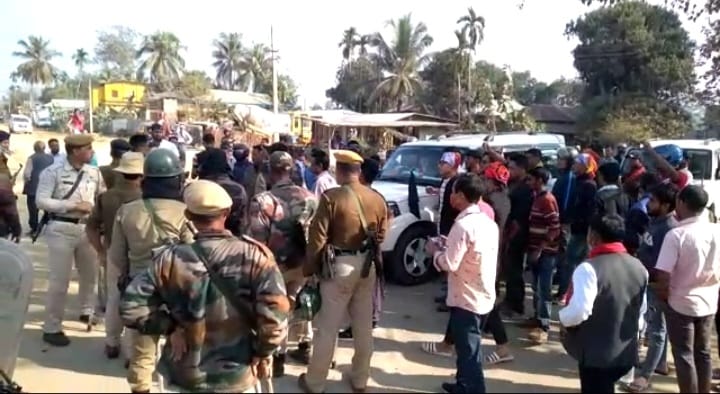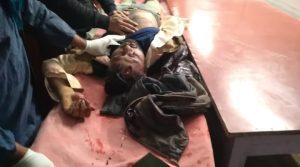
Surge in political violence: Is Tripura going the West Bengal way?
The rise in political violence in Tripura is largely because of the end of one-party hegemony in the state

The biggest challenge for the Election Commission (EC) in Tripura this time, will be to ensure peaceful Assembly elections, as the state has witnessed a spurt in political violence ever since the BJP came to power in 2018.
At least 14 cases of political violence, including that of a murder and mayhem, have been registered in various parts of the state since the announcement of the poll schedules on January 18, sparking fear of Tripura again going the West Bengal way, as far as poll-related violence is concerned.
West Bengal has a long history of political violence. At least eight people were killed, while many including security forces were injured and several candidates were attacked during the 2021 Assembly elections, as the state maintained its ignominious tradition. Tripura too has witnessed an unprecedented rise in political violence in the past five years, indicating that this Bengali-majority state is emulating the West Bengal model of politics.
History of political violence in Tripura
It all started with the razing of two statues of Russian Communist revolutionary Vladimir Lenin in the state, allegedly by the jubilant BJP workers, shortly after the party toppled the Left Front government in the state in March 2018.
The CPI(M) had claimed that 25 of its cadres were allegedly killed by BJP activists and its ally Indigenous People’s Front of Tripura (IPFT), in the past five years. The BJP in the past blamed a section of its unidentified supporters, who had migrated from the CPI(M), for creating the unrest.
Also read: Tripura polls: BJP will form next govt, says Sarma as CM Saha files nomination
The violence peaked during the 2021 civic elections when more than 20 candidates of the CPI(M) and the TMC were attacked and the Opposition parties were allegedly prevented from taking part in the electioneering in many parts of the state.
Poll violence rages in Tripura before 2023 Assembly elections
The trend now continues in the run up to the upcoming Assembly elections even as the poll-panel has announced its zero poll-violence mission.

A 44-year-old Tipra Motha worker, Pranajit Namasudra, died after he was dragged out of his car and assaulted by “unknown miscreants” in the state’s Dhalai district on January 18. On the same day, senior Congress leader Ajoy Kumar sustained head injuries when he was allegedly attacked by BJP workers.
A BJP state SC Morcha leader, Suman Das, was stabbed by unidentified miscreants in Aralia of Agartala on January 24. Though, the police claimed the incident was related to business rivalry, the BJP claimed rival political parties were involved.
Also read: Tripura Assembly polls: BJP releases first list; finalises seat-sharing with IPFT
End of one-party hegemony in Tripura led to political violence
The rise in political violence in the state is largely because of the end of one-party hegemony in the state.
“It is not that Tripura never had witnessed political violence in the past. In the 1988 elections that saw Congress and Tripura Upajati Juba Samiti coalition coming to power defeating the CPI(M)-led Left Front were marred by widespread violence and rigging,” pointed out veteran Tripura journalist Sekhar Datta.
The CPI (M) had accused Congress stalwart late Santosh Mohan Dev of orchestrating the violence and dubbed him as as “Santrash” (terror) Mohan Dev, a sobriquet that eventually became his identity in the state.
More than 10 people were killed, over a hundred were injured and several poll booths were also demolished in poll-violence in the state ahead of the 1991 Lok Sabha elections. The Marxist supporters were mainly at the receiving end of the violence unleashed after the assassination of former Prime Minister Rajiv Gandhi.
“There was no element of spontaneity in the violence. It was planned days ahead of polls and Rajiv’s death came in handy,” former Tripura chief minister Nripen Chakrabarty had alleged at that time. At least four people were killed in election-related violence ahead of the 1993 Assembly polls that had elected the Left Front back to power.
Also read: Tipra Motha to go it alone in Tripura assembly polls: Debbarma
“The culture of political violence subsided after the Congress became politically weak in the state in late 1990s, giving a free run to the Left Front, which ruled the state uninterruptedly from 1993 to 2018. The violence raised its ugly head again after the BJP became a powerful political force, ending the Left monopoly in state politics,” said Datta.
EC arrangements to prevent poll-related violence
To ensure peaceful elections, the security forces are carrying out area-domination exercises and naka checkings, said Tripura chief electoral officer Kiran Gitte. “We have provided security cover to all the 305 candidates who have filed nominations, without waiting for scrutiny and withdrawal of nominations,” Gitte said on Monday evening.
Meanwhile, the commission has identified 1,100 polling booths as “vulnerable” and 28 booths as “critical” out of the 3,328 polling booths across the state. As Tripura goes to polls on February 16, a senior police said that already 200 companies of central armed paramilitary forces have reached the state and 200 more companies are on their way.

